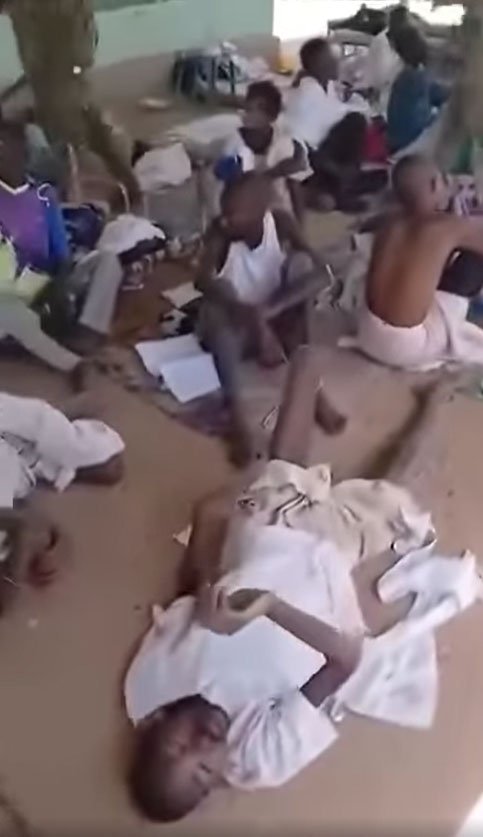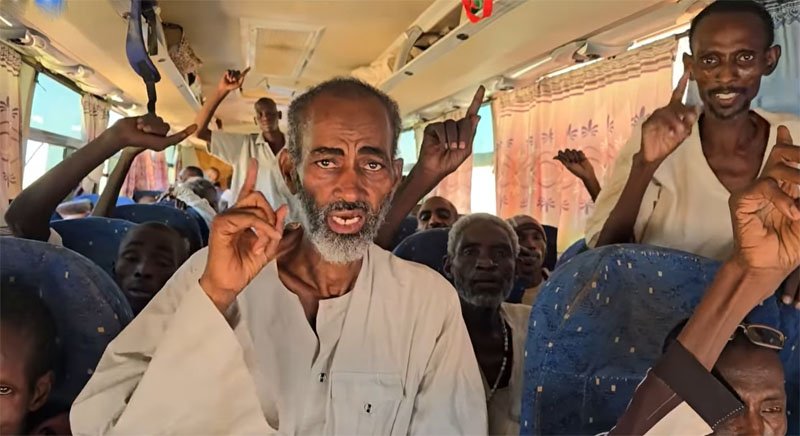“Death Camps”… Sudanese Army Victories Uncover Further Atrocities by the RSF Militia

Port Sudan – Sudanhorizon – Talal Ismail
“We were losing more than 50 prisoners daily, and we could not fulfil our role as doctors in treating the sick.” These were the words of Dr Abdel-Baqi Ahmed Mahmoud, a recently released prisoner from captivity in the Jebel Aulia area, south of the Sudanese capital, Khartoum. In a widely circulated video, he recounted the humanitarian tragedy endured by thousands of forcibly detained individuals in the Rapid Support Forces (RSF) prisons in Khartoum before the Sudanese army liberated them.
Dr Abdel-Baqi continued his harrowing account: “We were deprived of practising our religious rituals, denied medical care, and prevented from exercising our right as detained doctors to save patients who were suffering.”
He added: “The RSF would wait for a number of sick detainees to die and then dispose of the bodies in sewage channels or mass graves. We were losing between 50 and 60 prisoners daily.”
According to Dr Abdel-Baqi, as the army tightened its grip, the RSF’s goal was to transfer prisoners to Darfur to enslave them, forcing them to carry weapons and heavy ammunition.
“Unfortunately, this is what happened. But thanks to God Almighty, the armed forces’ victory and entry into Jebel Aulia saved us. This victory is a salvation for the dignity of Sudanese people,” he stated.
He further revealed that, as they fled via the Jebel Aulia bridge, RSF forces abducted several officers, including two high-ranking Republican Guard officers and 100 other officers, transporting them to Darfur. He added: “There are more than 2,000 missing prisoners whose fate remains unknown.”
On Friday morning, the Sudanese army began transferring a number of released detainees from Jebel Aulia to the city of Al-Qutaynah in White Nile State. The number of those freed is estimated to exceed 4,000.
Harrowing Accounts from Former Detainees
In Port Sudan, we met Muizz Abbas, the president of the Sudanese Athletics Federation and a member of the Sudanese Olympic Committee, who was recently released from RSF prisons. Speaking to Al-Muhaqiq, he said: “What happens inside RSF detention centres can only be described as a humanitarian catastrophe. Hundreds of us were crammed into a basement without even a place to relieve ourselves.”

Systematic RSF Atrocities
Baher Idris Abu Garda, head of the Sudan Justice Alliance (Tis’a), told Al-Muhaqiq: “The appalling condition of those detained, forcibly disappeared, and held as prisoners by the RSF is not surprising. The RSF has exhibited the same behaviour for over two decades. You have seen what happened in Geneina, West Darfur, where people were buried alive, and the Massalit tribe was subjected to acts of genocide.”
He added: “You have also seen the genocidal atrocities committed in villages in Gezira State, such as Wad Al-Noora and Al-Sareeha, as well as the horrifying incidents of container executions, where countless victims were burned beyond recognition. These crimes are just the tip of the iceberg, and more horrors will undoubtedly emerge.”
Legal Perspectives on War Crimes
Legal and constitutional expert Dr Abdullah Daraf told Sudanhorizon: “We have witnessed the horrific crimes committed by the RSF against civilians and the vast number of prisoners who were released from their detention centres. Those of us who monitor humanitarian affairs had been following the plight of civilian detainees, and we had information indicating that the RSF was operating more than 46 detention centres in Khartoum State alone.”
He continued: “This militia has systematically targeted unarmed civilians, committing multiple crimes including murder, enforced disappearance, arbitrary detention, and deprivation of liberty. Such acts are classified as war crimes and crimes against humanity under the 1949 Geneva Conventions, which mandate the protection of civilians during wartime, as well as the related protocols and the 2006 International Convention for the Protection of All Persons from Enforced Disappearance. International humanitarian law explicitly criminalises these atrocities against defenceless civilians.”
Dr Daraf further stated: “The conditions in RSF detention centres were utterly deplorable, lacking even the most basic necessities for survival, including food, healthcare, and sanitation. This led to the deaths of large numbers of detainees, which constitutes a war crime and a crime against humanity.”
He added: “The suffering endured by these detainees and their families was immense. There was no opportunity for their loved ones to contact them or even know their whereabouts. It was a deliberate and systematic policy of enforced disappearance, targeting individuals based on ethnic identity—an unspeakable crime.”

Pursuing Legal Action
Dr Daraf confirmed that legal efforts are underway to hold those responsible accountable, stating: “We are currently documenting these crimes to take legal action against these new barbarians. We thank God for the release of the forcibly detained individuals.”
He noted that the number of detainees and forcibly disappeared individuals in Khartoum State alone exceeds 8,000, not including those who perished in captivity. He added: “These crimes against unarmed civilians will not go unpunished. Justice will be served, and we will hold these criminals to account, God willing.”
Calling for International Action
Dr Hani Taj Al-Sir, head of the Honour and Justice Lawyers’ Organisation, told Al-Muhaqiq: “The dire conditions in which the prisoners were found demonstrate that the RSF has no regard for the Third and Fourth Geneva Conventions, which prohibit cruel, inhumane, and degrading treatment of prisoners. These conventions, along with the First and Second Additional Protocols, explicitly forbid the mistreatment of detainees.”
He continued: “The treatment of these detainees also represents a blatant violation of the 1966 International Covenant on Human Rights, which prohibits torture, starvation, and all forms of cruel treatment. The issue of human rights violations must be internationalised, and media coverage must be intensified so that all human rights organisations become aware of the brutality of this militia.”
Meanwhile, Sudanhorizon has learned that Sudan’s National Committee on War Crimes, headed by the country’s Attorney General, has begun preparations to document further atrocities committed by the RSF in secret detention centres. These include acts of torture, forced labour, identity-based killings, and gross violations of human rights.
Shortlink: https://sudanhorizon.com/?p=4880

